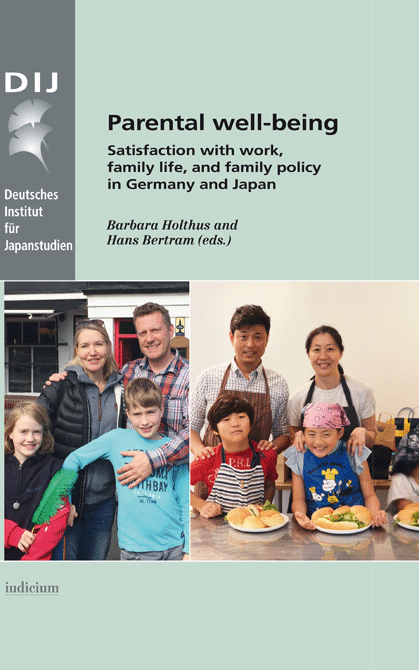Japan und Ostasien
Germanistik /
Deutsch
als Fremdsprache
Kulinaristik
Kulturwissenschaften
|
 |
Senden Sie Fragen oder Kommentare zu dieser Website an:
info@iudicium.de
iudicium verlag
Dauthendeystr. 2 · 81377 München
Deutschland
Copyright · 2024
|
|
| |
|
 Holthus,
Barbara / Bertram, Hans (eds.) Holthus,
Barbara / Bertram, Hans (eds.)
Parental well-being
Satisfaction with work, family life, and family policy in Germany and Japan
2018 · ISBN
978-3-86205-050-5 · 310 Seiten, geb. · EUR 50,—
Monographien, herausgegeben vom Deutschen Institut für Japanstudien (Bd.
62)
“Pursuing happiness is not only idealistic, it is the world’s best and
perhaps only hope to avoid global catastrophe” (Global Happiness Policy
Report 2018). With that, the report argues for happiness as overarching
policy goal. This volume argues that parental well-being is well qualified
to assume a central role for governments of industrially advanced nations
that are in need of coping with the challenges of low fertility and societal
aging.
More than 4000 mothers and fathers of young children in Germany
and Japan have been surveyed in regard to their well-being and satisfaction
with many aspects related to their work and family lives. The volume brings
together 13 scholars to analyze this unique dataset.
TABLE OF CONTENTS:
Introduction
Parents in transitional Germany and
Japan (Hans Bertram and Barbara Holthus) · Reflexive modernity in practice:
The methodology of comparing German and Japanese parents (Matthias Huber)
A macro view on parents
Care, human capital, and
demographic transformation (Hans Bertram)
Parenting and childcare
Class and conformity revisited: Parental values and self-conception in
contemporary Germany and Japan (Carolin Deuflhard) · Childrearing attitudes
and values of German and Japanese parents (Junko Takaoka and Yi Sun) ·
Reflecting on the dimensions of fathering in Germany and Japan (Sophie
Olbrich)
Self, social relatedness, and social structures
Social resources and parental well-being: A comparison of Japanese and
German parental ego-centric networks (Marina Hennig) · Partnership
satisfaction in Germany and Japan: The role of family work distribution and
gender ideology (Peter Fankhauser, Barbara Holthus, Stefan Hundsdorfer) ·
Parental health, personality, and life satisfaction (Masumi Sugawara and
Satoko Matsumoto) · Profession, employment, and parental well-being in Japan
and Germany (Nobuko Nagase)
Family policy well-being
Money, time, and infrastructure as elements of a new German family policy
(Hans Bertram) · Parental satisfaction with family policies in Japan: An
overview (Barbara Holthus)
Conclusion
Satisfaction and a plural modernity: German and Japanese parents (Hans
Bertram)
|
|
|
|
